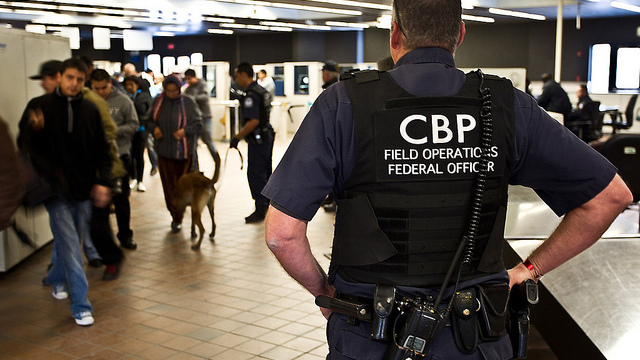
I've been contemplating the issue of facial scanning recognition technology. About three weeks ago, the New York Times ran an article about the use of such technology by Customs and Border Protection (CBP), an agency within the Department of Homeland Security (DHS), at selected airports where it is deployed to scan departing international passengers in order to potentially detect terrorists, criminals, and immigration violators.
The Times cited a Georgetown University study condemning the practice as unreliable and violative of Americans' privacy. Needless to say, the American Civil Liberties Union (ACLU) has chimed in with its condemnatory utterances as well.
Interestingly, about six months earlier, National Public Radio (NPR) did a piece on the scanning technology deployment, also citing privacy concerns, but noting that the process takes no more than five or six seconds.
It's worth observing that the Times, Georgetown University, the ACLU, and even NPR all have a decided bias in favor of open borders, which makes one wonder whether that hasn't influenced their views on the use of facial recognition technology, which is, after all, just one tool among many being tested by DHS to make Americans safer.
As a result of the Times article, a couple of senators have taken steps to voice their objections and ask DHS to shut the program down. This seems to me both premature and an overreaction.
The Georgetown study authors describe facial technology as "invasive", which is laughable. I don't suggest that there are no privacy issues, or that they should be given short shrift, but it's also worth putting the matter in context. Remember that airports are public spaces. Remember also that travel by international aircraft is still a prime target for terrorists. That this scanning technology is being used at departure is of no more moment than if it is used to screen incoming travelers, which is clearly an area in which the federal government exercises a plenary authority to control its borders. In the departure context, do we really want to be the country that boards a known terrorist who hijacks or blows up the plane en route to somewhere else, simply because we were hypersensitive about possibly being able to photo-match his presence through facial scans?
In any case, how much privacy do travelers — any travelers, including Americans — expect at airports any more? Their luggage is routinely opened and pawed through by anonymous Transportation Security Administration (TSA) officials. They queue up in long lines and present themselves, their boarding passes, and photo IDs to another TSA official just to get the opportunity to have themselves and their carry-on bags scrutinized further along in the security maze. Then they are subjected by yet more TSA officials to the most invasive searches by means of backscatter technology capable of revealing their body parts beneath clothing, or worse, by manual body search if the screeners aren't confident of what they see on their screens.
Yes, the study's authors are right that the scanning technology isn't 100 percent accurate — it isn't a cure-all — but it is a worthwhile tool, one of many used to try to sort needles out of an incredibly large haystack. It's absurd to presume that CBP agents would be able to stand and watch departing passengers walking down the gangway and in any way at all be able to remember the faces of all the known miscreants of record to the U.S. government. Facial recognition simply helps the process along.
By way of example, Russian authorities have paired facial recognition technology to over 5,000 closed circuit television (CCTV) cameras in public areas such as intersections and the Moscow metro. Yes, it would be easy to scoff at this, given Russia's ill repute in the United States these days, but it should be remembered that Russia, too, has a problem with Islamic terrorists who have attacked their metro, their airports, and even their schools, resulting in the death of over 300 persons, most of them children. And according to Russian officials, the early results have been promising.
But Russia isn't alone. Our friends in the United Kingdom, a bastion of liberal democracy, have also been experimenting with mating CCTV to real-time facial recognition scanning technology. There, too, it has already proven to have some utility and future promise.
And meantime, irony of ironies, back here at home, Newsmax reports that TSA is testing facial recognition technology to speed travelers through the phalanx of officials who stand guard at the various and multiple checkpoints it uses to protect air travelers (creatively described as "friction points" by a PR-savvy airline executive in the article). Interestingly, I didn't see any worrisome critiques about privacy invasions for this use of the very same technology that is causing such heartburn in another context.
